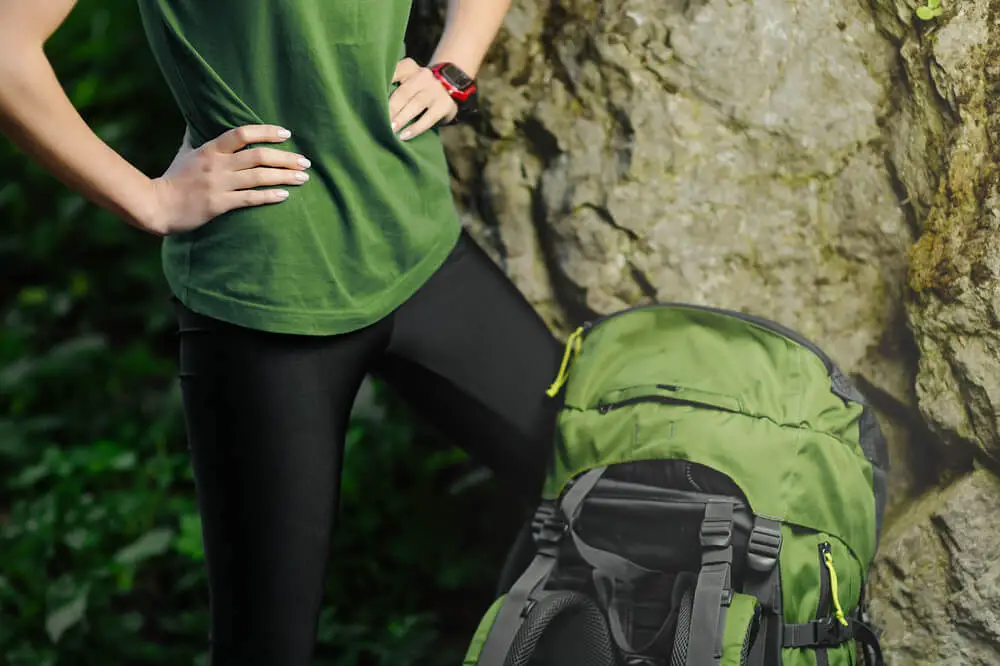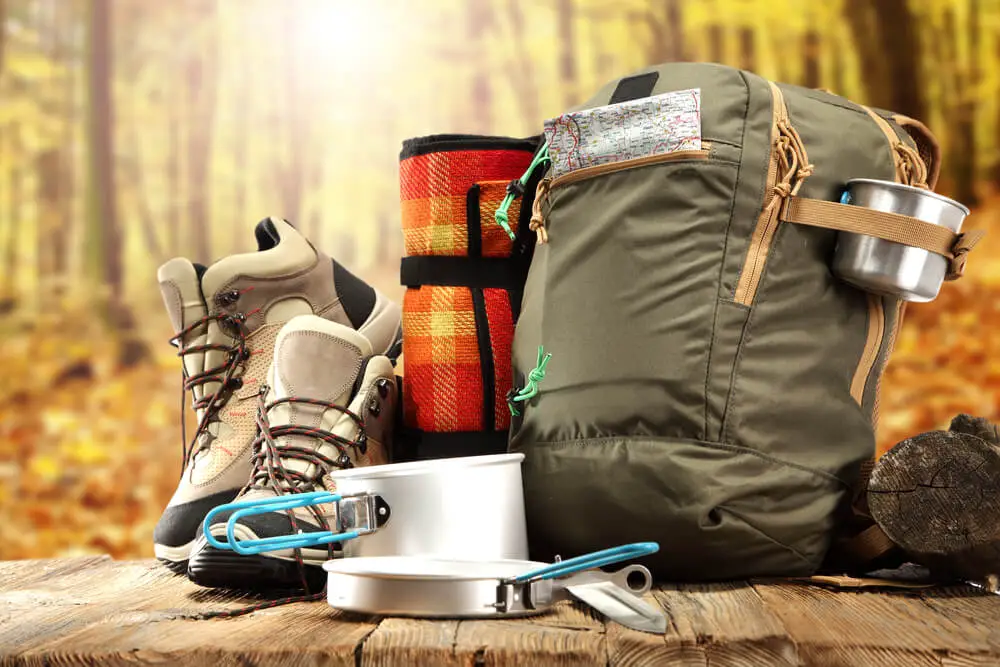Whether you're new to backpacking or an old pro, choosing your base weight is an essential part of enjoying your time on the trail. The lower your base weight, the easier it will be to make good time on your hike.
More...
Table of Contents
What Is a Backpacking Base Weight?
When you go out for a hike or backpacking trip, the items in your backpack that aren't consumable make up what's known as your base weight. Items that might contribute to your base weight are your tent or hammock, sleeping bag, cookware, first aid kit, and clothing.
It might be hard to figure out which items are essential and which ones aren't. The most important thing to remember is, the lighter the pack, the less energy you have to put into carrying it.
A lower base weight is doubly important if you're hoping to move through your trip quickly. When you're doing a thru-hike on a long-distance trail, every ounce will matter.

How Can You Lower Your Base Weight?
The best way to lower your base weight is by carefully choosing which items are essential and investing in lightweight equipment wherever possible. There are plenty of options available for lighter gear, so you won't have any trouble finding what you need.
What Should My Base Weight Be?
There are a few things to consider when determining your base weight for backpacking. Specifically, you want to keep the following things in mind:
- Your trip's distance
- How long you'll be on the trail
- Your experience level
In general, you want to keep your pack at or below 20% of your body weight. So, if you weigh 150 pounds, your pack shouldn't weigh more than 30 pounds.
However, keep in mind that 30 pounds for a person with significant trail experience might be more manageable than for someone just starting out. That means you should always take your loaded pack on a few shorter trial runs to make sure you can handle its weight on a more extended trip.
To calculate your base weight, simply multiply your weight by .20 or use a handy online calculator.

What Gear is Essential?
When it comes to backpacking, there are a few things you just can't go without. That said, there are plenty of options for all of your essential gear that can help keep your base weight down.
Backpack
Your backpack is one of the most critical pieces of equipment you'll take on the trail with you. However, there are a few things you'll need to keep in mind when choosing your backpack.
Capacity
How much do you need your pack to hold? If you don't plan to hike for more than a day or two, a 30-liter capacity pack might be OK. On the other hand, a longer trip might warrant a 70-liter pack or more.
Bear in mind that the larger the pack, the greater your base weight. Do a bit of research on pack sizes before making your final decision.
Features
Backpacks have a lot of convenience features to choose from, so be sure to research the different options available. Some choices include:
- Frame type (interior/exterior/frameless)
- Pockets
- Hydration reservoir
- Ventilation
- Attachment points for things such as poles, clipped items, and snowshoes
Sleeping Gear and Shelter
Sleeping gear and shelter will probably be your bulkiest items, so the first thing you'll need to do is pick the right gear. Your best options will be a tent or a hammock, but you could lay out a sleeping back on the ground, too.
Each option comes with its own pros and cons, and all will affect the weight of your pack.
Tent
A tent will offer you the most space to move around. It'll also give you great shelter from the elements. If rain is in the forecast, a tent will be the best way to keep dry.
However, a tent requires a good camping site. If you're hiking in an area that doesn't have many clear spaces, it might be tough to find a good spot to pitch your tent. Likewise, if the ground is rocky, you might find it hard to get comfortable.
As far as weight, tents can vary quite a bit. You want a tent that weighs about 2.5 pounds per person for backpacking purposes. So, if you're the only one using the tent, try to find one that's under three pounds to keep weight down.
Hammock
Although some might balk at the idea of hammock camping, don't write it off just yet. Hammock camping can be trickier than tent camping because the setup can take a bit of practice, but it can actually be more comfortable.
Many hammocks will have a mesh cover, so you won't have to worry about critters getting to you in your sleep. If it looks like rain, you can easily construct a shelter using a paracord and a tarp.
Hammocks usually weigh in at under three pounds, so they're about even with tents.
On average, tarps weigh about 3.5 ounces per square meter, and paracord generally weighs 7 ounces per 100 feet.
Sleeping Bag
Although a sleeping bag isn't always a necessity, I've decided to include it on this list because a suitable sleeping bag can offer many advantages.
In particular, a sleeping bag will offer comfort at the end of a long day of hiking, added warmth in case the nighttime temperature dips, and protection from the elements.
The best options are a mummy-style sleeping bag or a barrel-shaped bag. These take up the least amount of space in your pack and usually weigh less than three pounds, depending on the bag’s fill and shell.
Other sleeping options to consider are self-inflating air mattresses and sleeping pads, which can give you some added protection from rocky or wet ground. A lightweight mattress or pad will add about 1-2 pounds to your pack.
First Aid
It should go without saying that first aid should be a priority when packing. However, you don't need to go overboard. You can purchase a small, lightweight first aid kit that provides all the basics you'll need to treat minor injuries.
However, if you're concerned about a twisted ankle or a fall, you could add an item or two that will make it easier for you to be found if you need to call for help. For example, a flashlight with a strobe option is a lightweight choice that can offer you some peace of mind.
Sustenance
Although food and water aren't factored into your base weight, their containers will be. Water bottles, thermoses, and coolers all add significant weight to your pack, so take care when choosing your sustenance.
Foods that are lightweight or have little to no packaging will be ideal for your trip. For example, dehydrated foods only weigh a few ounces each. You can also eat many fruits, nuts, and berries whole, without any leftover peels or rinds that can harm the local wildlife.
Something to consider when packing food is to remove any plastic packaging ahead of time and put your food items in paper bags. Then, you can use the bags for kindling when you stop for the night.
Try to avoid including any items that require refrigeration, such as sandwiches or dairy products. Non-perishables are your best bet if you want to minimize weight and stay nourished.
When choosing a water container, your options are a bottle or bladder. A water bladder can hold several quarts of water, won't take up much space, and weighs only a few ounces when empty.
Other Considerations
Other items you might consider bringing are a camp stove with cookware, an extra change of clothes, or a solar phone charger. Take a critical look at each item and make sure it's a "need" and not a "want."
That said, leaving room for a luxury item or two isn't a bad thing. For example, a book, small radio, or coffee can help you start and end your days on the trail with a bit of relaxation. After a long day of hiking, a little comfort can be pretty refreshing.
What Are the Advantages and Disadvantages of a Lower Base Weight?
Although a lower base weight might seem like a good thing, it's important to remember that lower weight has both pros and cons.
Pros
- Less to carry
- Options are more compact
- Lighter weight makes it easier to move quickly
Cons
- Fewer choices
- Not as much room for comfort items
Conclusion
The most important thing to remember when choosing any gear is comfort. A lightweight pack can easily be more of a hindrance than a help if it isn't comfortable on your back.
Figuring out your ideal backpacking base weight doesn't have to be complicated. Still, it will likely require some trial and error. However, it will be worth it once you can enjoy a long day on the trail without the burden of an overweight pack.
- Are Merrell Shoes Good? – An Unbiased Review of Merrell Footwear - December 9, 2023
- Where Are Merrell Shoes Made? - December 9, 2023
- Camping in 40-degree Weather: Tips and Tricks - September 25, 2023

![How Much Weight Can a Hammock Hold? [Find Answer In This Post] How Much Weight Can a Hammock Hold? [Find Answer In This Post]](https://grandcircletrails.com/wp-content/uploads/2022/01/How-Much-Weight-Can-a-Hammock-Hold-1-150x150.jpg)
![Are Keen Sandals Good for Hiking? [Are They Really Good For Hike?] Are Keen Sandals Good for Hiking? [Are They Really Good For Hike?]](https://grandcircletrails.com/wp-content/uploads/2022/06/are-keen-sandals-good-for-hiki-1-150x150.png)

![10 Best Budget Backpacking Tents Under $100 [Buyers Guide] 10 Best Budget Backpacking Tents Under $100 [Buyers Guide]](https://grandcircletrails.com/wp-content/uploads/2022/02/Budget-Backpacking-Tents-Under-100-1-150x150.jpg)
![How Much Should A Backpacking Tent Weigh? [Complete Guide] How Much Should A Backpacking Tent Weigh? [Complete Guide]](https://grandcircletrails.com/wp-content/uploads/2022/05/How-Much-Should-A-Backpacking-Tent-Weigh-150x150.jpg)
![How to Pack Toilet Paper for Backpacking? [Quick Answer] How to Pack Toilet Paper for Backpacking? [Quick Answer]](https://grandcircletrails.com/wp-content/uploads/2022/04/How-to-Pack-Toilet-Paper-for-Backpacking-150x150.jpg)